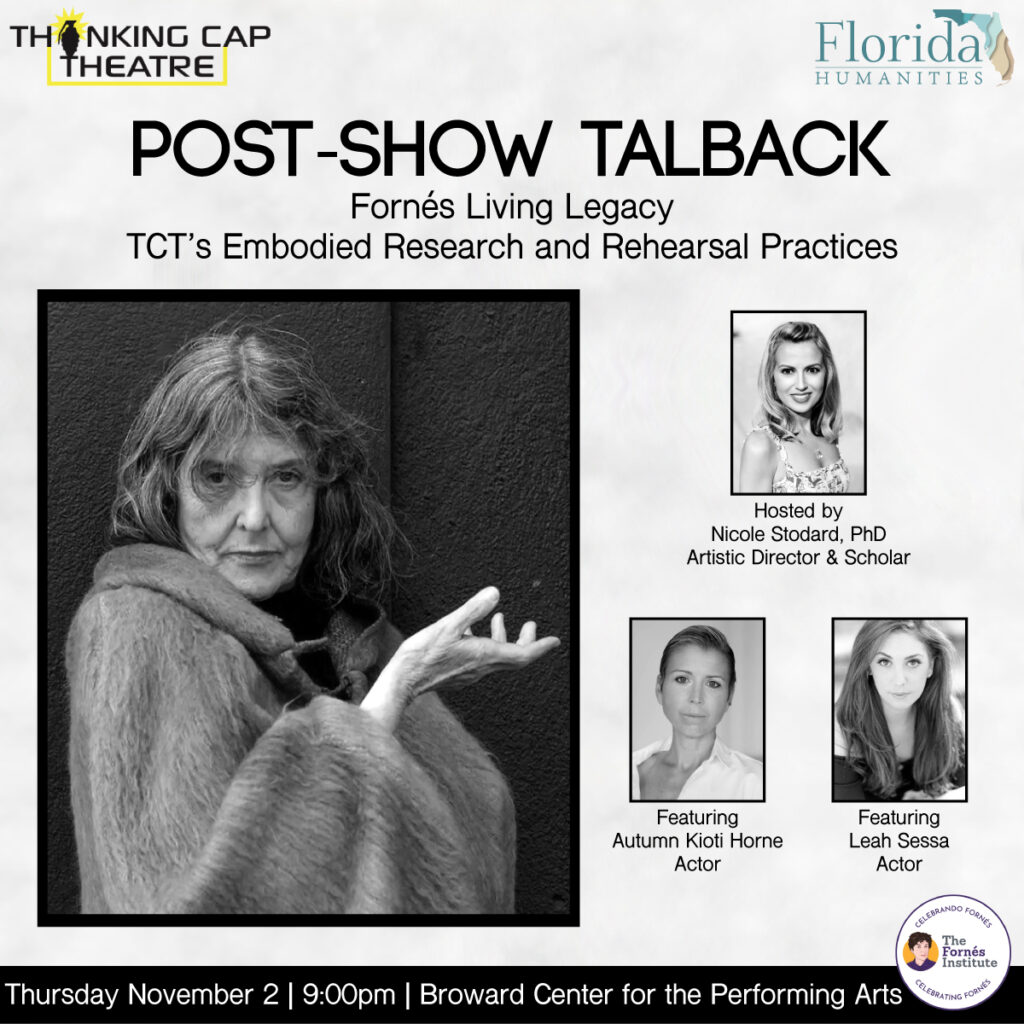POST-SHOW TALKBACK: Fornes’ Living Legacy
Hosted by Nicole Stodard PhD, Thinking Cap Theatre's Artistic Director
This program will allow attendees to learn about embodied pedagogy and embodied research methodology from a humanities scholar as well learn about how creative teams apply embodied practices to rehearse and perform works, such as Fornes’ Tango Palace, which literally and thematically explores animal and human embodiment and the potentially subversive and therapeutic power of role play.
The Talkback will take place directly after the 7:30pm performance of Tango Palace.
ABOUT THE HOST:
Dr. Nicole Stodard is an arts leader, interdisciplinary artist and adjunct faculty member in the Department of English and Communications at Nova Southeastern University in Fort Lauderdale, Florida. She holds a Master’s in Theatre from Trinity College Dublin and a PhD in English from the University of South Florida. Her book APHRA BEHN AND THE GLASS CURTAIN, an historical examination of gender inequality in professional theatre is currently under contract with Routledge. Nicole’s areas of specialization include early modern drama (Shakespeare and Behn); feminist and LGBTQ issues in drama and performance; the history of stage direction. Nicole is a member of The Fornes Institute and has contributed a chapter to the forthcoming Literature in Context Series essay collection on Fornes published by Cambridge University Press. A professional director and Full Member of the Society of Stage Directors and Choreographers, Nicole has directed and designed more than 30 main stage productions since 2010. Some credits include Happy Days by Samuel Beckett; Precious Little by Madeleine George; Dance Nation by Clare Barron; King Lear by William Shakespeare; Collective Rage by Jen Silverman; MUD by Maria Irene Fornes; The Rover and The Emperor of the Moon by Aphra Behn; and Cleansed by Sarah Kane. Her distinctions for direction and design include Carbonell Nominations for Best Director of a Play, Best Sound Design, and Best Costume Design; two Silver Palm Awards for Best Direction; and three NEW TIMES “Best Director” Awards. Learn more about her work at NicoleStodard.com.
ABOUT THE PANELISTS
Dr. Nicole Stodard is an arts leader, interdisciplinary artist and adjunct faculty member in the Department of English and Communications at Nova Southeastern University in Fort Lauderdale, Florida. She holds a Master’s in Theatre from Trinity College Dublin and a PhD in English from the University of South Florida. Her book APHRA BEHN AND THE GLASS CURTAIN, an historical examination of gender inequality in professional theatre is currently under contract with Routledge. Nicole’s areas of specialization include early modern drama (Shakespeare and Behn); feminist and LGBTQ issues in drama and performance; the history of stage direction. Nicole is a member of The Fornes Institute and has contributed a chapter to the forthcoming Literature in Context Series essay collection on Fornes published by Cambridge University Press. A professional director and Full Member of the Society of Stage Directors and Choreographers, Nicole has directed and designed more than 30 main stage productions since 2010. Some credits include Happy Days by Samuel Beckett; Precious Little by Madeleine George; Dance Nation by Clare Barron; King Lear by William Shakespeare; Collective Rage by Jen Silverman; MUD by Maria Irene Fornes; The Rover and The Emperor of the Moon by Aphra Behn; and Cleansed by Sarah Kane. Her distinctions for direction and design include Carbonell Nominations for Best Director of a Play, Best Sound Design, and Best Costume Design; two Silver Palm Awards for Best Direction; and three NEW TIMES “Best Director” Awards. Learn more about her work at NicoleStodard.com.
Dr. Lillian Manzor is Associate Professor of Modern Languages and Literatures and Hemispheric Caribbean Studies at the University of Miami and Founding Director of the Cuban Theater Digital Archive (www.cubantheater.org). She is series coeditor of Sualos, published by Havana’s Editorial Alarcos and Miami’s CTDA Press. She is widely published in Latin American and Latinx theater and performance studies. She has coedited Latinas on Stage, Teatro cubano actual: dramaturgia escrita en los Estados Unidos, and coauthored Cuban Theater in Miami: 1960-1980 (http://scholar.library.miami.edu/miamitheater/) and El Ciervo Encantado: An Altar in the Mangrove (http://ciervoencantado.tome.press/). Her book Marginality Beyond Return: US-Cuban Performances and Politics is forthcoming with Routledge July 2022. Her research has been funded the Andrew W. Mellon Foundation, National Endowment for the Humanities, American Council of Learned Societies, Ford Foundation, and Rockefeller Foundation. As a community engaged scholar, she has fostered US-Cuba cultural dialogues through theater and performance since 1993.
ABOUT THE PLAY: TANGO PALACE
TCT’s first production at the Broward Center for the Performing Arts will be TANGO PALACE, an early play by the late great master playwright and Pulitzer nominee, María Irene Fornés (1930-2018). A nine-time Obie Award winner, Fornés was a prolific author of nearly forty plays, a pioneer of the 1960’s Off-Off Broadway movement, and an originator of site-specific and immersive theatre. In TANGO PALACE, written in late 1962 and first staged in 1963 in San Francisco, Fornés reveals her indebtedness to Samuel Beckett's absurdism, Oscar Wilde's wit, and a modern camp style that her one-time lover Susan Sontag captured in her landmark essay, “Notes on Camp.”
TANGO PALACE, a dark, funny, and whimsical examination of perilous passion, tests the limits of the age-old saying that 'all is fair in love and war.’ When TANGO PALACE premiered, it was so successful that Arthur Ballet quickly anthologized it in Playwrights for Tomorrow.
TANGO PALACE will resonate with anyone who's ever tangoed with a tumultuous lover and lived to tell.
***Funding for this program was provided through a grant from Florida Humanities with funds from the National Endowment for the Humanities. Any views, findings, conclusions or recommendations expressed by Thinking Cap Theatre do not necessarily represent those of Florida Humanities or the National Endowment for the Humanities.***



0 comments on “POST-SHOW TALKBACK: Fornes’ Living Legacy”